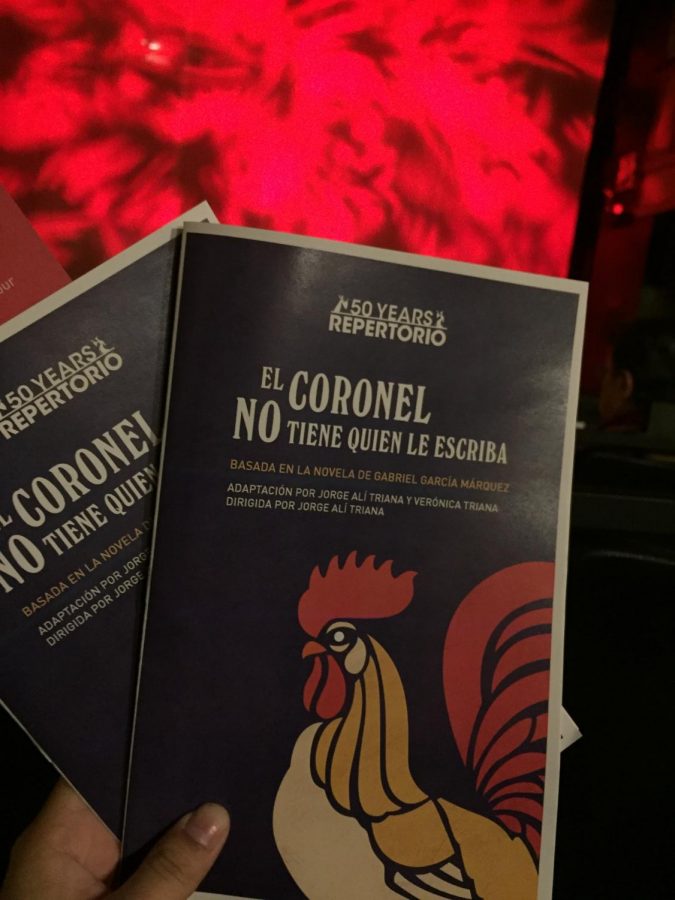Marquez Returns To Limelight In ‘Colonel’
The playbill for “No One Writes to the Colonel.”
March 6, 2018
Colombian novelist Gabriel García Márquez was brought back into the limelight thanks to Repertorio Español. Founded in the 1970s, performance venue Repertorio Español has been dedicated to diversifying New York City’s theater scene by producing plays by and for the Hispanic and Latino community. Its latest show, “No One Writes to the Colonel,” is based on the Nobel Prize-winning Márquez’s novella, “El Coronel No Tiene Quien Le Escriba.”
“No One Writes to the Colonel” tells the story of a retired colonel waiting for his veterans’ pension, or aid from his government to its people, while living in poverty with his wife and grieving over their deceased son.
The play is performed entirely in Spanish with English subtitles. Every actor gives enthusiastic performances, which ignite the stage and the audience with a vibrant energy.
The town’s doctor (Luis Carlos de la Lombana) accentuates each of his lines with budding charisma and elevates every scene he graces. The Colonel’s wife (Zulema Clares) delivers a full-bodied performance as a woman suffering from asthma, staying true to character by coughing throughout the show.
However, the true scene stealer has to be the live rooster — both an unusual embellishment and major role in the play. The rooster serves as a lasting reminder of the Colonel’s deceased son and if made a champion at an upcoming cockfight, is the couple’s only remaining hope to survive poverty.
Certain elements of the plot and dialogue echo absurdist theater — most notably, the rooster, which maintains a measure of poise despite the obvious hilarity of how revered he is by the cast. The Colonel’s hopeful and hopeless patience for his pensions, which are likely never to happen, is also quite absurd.
For those interested in absurdist theater, “No One Writes to the Colonel” is amusing and poignant. For those without an already existing appreciation for the style, the show’s flow could prove confusing.
Another important point to note is the play’s political undertones. On a surface level, the story’s individual elements may seem random, but each puzzle piece highlights Márquez’s honest illustrations toward the personal effects on individuals living in a country overtaken by martial law and censorship. These themes are revealed through the son’s death — a result of political chaos — and the Colonel’s lack of pension.
The family’s last hope and a major source of its financial burden, the rooster shows just how dire their economic situation truly is. By the show’s conclusion, the Colonel’s obsession with the rooster and his pension shift from amusing to tragic, and the audience is left to grapple with the absence of a satisfying ending.
Ultimately, Márquez’s poetic style falters a little when adapted for the stage. Without the writer’s artful description to highlight the ridiculousness of his dialogue and sequences, a few key lines struggle to resonate clearly with the audience.
Though the strokes of political commentary feel relevant, the way they are served feels slightly outdated, especially, when shows like “Hamilton” and “Angels in America” are much more explicit in their commentaries.
“No One Writes to the Colonel” is a small story with large implications that, while important, prove the difficulty of translating Gabriel Garcia Marquez’s poetic narrative from the page to the stage.
“No One Writes to the Colonel” will run through May 12 at Repertorio Español.
Email Zuleyma Sanchez at [email protected].
























































































































































